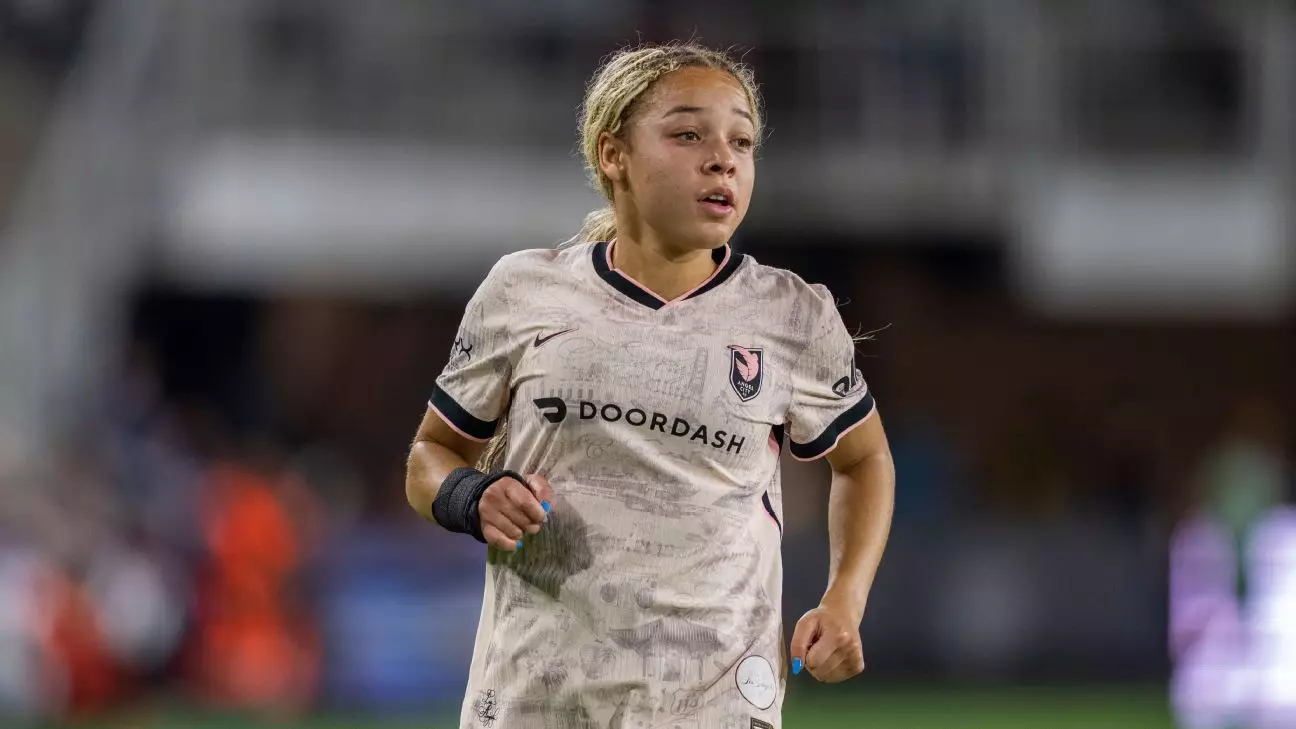In a world where athletes are often perceived as invincible, the recent ordeal of Savy King, defender for Angel City FC, serves as a powerful reminder of their humanity. King’s near-tragic collapse during a match against the Utah Royals on May 9 sent shockwaves through the soccer community. Diagnosed with a heart abnormality that necessitated surgery, Savy’s journey has not only highlighted the fragility of life but also the incredible resilience that lies within the human spirit. After spending over a week recovering in Cedars-Sinai Medical Center, King was released from the hospital this past Saturday, grateful for the love and support she has received.
In her heartfelt social media post, which featured a cheerful photo of her holding a heart-shaped pillow, Savy articulated emotions that resonated deeply with many: “I know God’s got me, and I’m looking forward to recovering and getting back out on the field!” Her message, infused with hope and gratitude, underscores a profound truth—that challenges can be transformed into opportunities for growth and reflection.
The Incident That Shook a Community
For those who witnessed the incident, the scene was harrowing. King collapsed on the field and received medical attention for over ten minutes before being transported to the hospital. This alarming moment not only placed her life at risk but also ignited a conversation about the protocols that govern player safety during emergencies. It raises questions about the decisions made by the league officials when they opted to continue the match despite the critical circumstances unfolding on the field.
The aftermath of such a traumatic incident has stirred a considerable response from fans, players, and the NWSL Players Association. The league received significant backlash for allowing the game to proceed—a point emphasized by the Players Association, which asserted that “any medical emergency that requires the administration of life-saving care should bring play to an end.” This sentiment reflects a broader ethos: the health and well-being of players should undeniably come first, and any postponement should be warranted in the face of danger.
Transforming Tragedy into Change
In the wake of the incident, the NWSL issued an apology, stating that in future circumstances similar to King’s collapse, the game’s continuation would no longer be an option. This statement illustrates a growing awareness and commitment to the health of athletes, demonstrating that the league is prepared to learn from this experience and adapt its policies accordingly.
As a result, Savy King’s situation has not only inspired a collective push for change within the league but also ignited a discussion regarding player safety across all professional sports. The heartbreaking nature of such incidents serves as a call to action for organizations, leagues, and fans to prioritize the welfare of athletes, ensuring safety protocols are precise and immediately actionable.
A Community United in Strength
King’s recovery has been marked by an outpouring of support from her teammates and fans, all of whom rallied around her during this trying time. In a significant show of solidarity, both Angel City FC and Bay FC players wore “SK3” shirts as a tribute before their match following her release. Moreover, the sight of Angel City captain Sarah Gorden holding up King’s jersey encapsulates the bond that unites these athletes—not just as competitors but as a family.
The strength of King’s community, both familial and sporting, played a crucial role in her recovery process. The importance of mental health, camaraderie, and support cannot be overstated, especially when a player grapples with physical and psychological challenges after such traumatic experiences. The responses show that there is a larger family that extends beyond teams and leagues, demonstrating compassion in times of crisis.
The Road Ahead
As Savy King embarks on her recovery journey, she stands as an example of resilience and the indomitable spirit of an athlete. Her experiences underscore the importance of support networks and the collective responsibility that the sporting community has in safeguarding its members. With a promising prognosis and the love of her family, teammates, and fans behind her, King’s return to the field is not just a personal milestone but a moment for the entire soccer community to reflect and unite in the spirit of compassion and improvement.
In a landscape where victories are often celebrated without pause, Savy King’s story reminds us that the true measure of success may very well lie in how we react in times of adversity, pushing for inclusive policies that ensure the safety and well-being of athletes above all else.

